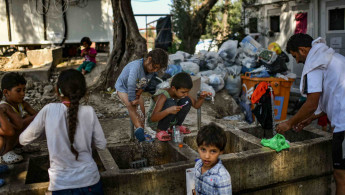Greece to evacuate 2,000 refugees in overcrowded Lesbos camp
Government spokesman Dimitris Tzanakopoulos said those being moved out of the Moria camp, which houses 9,000 people in a facility built for 3,100, will be sent to the mainland so their asylum claims can be examined.
"The situation in Moria is indeed difficult, it is indeed at the limit," Tzanakopoulos said.
Regional governor Christina Kalogirou had threatened to shut down the facility unless the Greek government improves conditions at Moria.
Doctors Without Borders has called for the emergency evacuation of vulnerable people at the camp to the mainland and other European Union countries, citing an increase in suicide attempts and self-harm among children in Moria and cases of sexual attack.
"This is the third year that (we) have been calling on the Greek authorities and the EU to take responsibility for their collective failures and to put in place sustainable solutions to avoid this catastrophic situation," said Louise Roland-Gosselin of Doctors without Borders.
"It is time to immediately evacuate the most vulnerable to safe accommodation in other European countries and to stop this never-ending cycle of emergency decongestions and the horrendous conditions we continue to witness in Moria," she added.
Twitter Post
|
Thousands of people fleeing violence and poverty at home are still arriving at Greek islands from the nearby Turkish coast. Between Friday and Sunday, more than 600 reached Lesbos alone.
Under a 2016 deal between the EU and Turkey designed to halt the flow of refugees and migrants into Europe, those arriving on Greek islands are held in detention camps there and face deportation back to Turkey unless their asylum applications are approved.
But the massive backlog of applications has led to severe overcrowding on the Greek island camps, even as authorities move hundreds of vulnerable people to the mainland.
The increasingly hostile stance toward migrant flows reflects hardening public opinion in Europe following the arrival of hundreds of thousands of people fleeing war or poverty in Africa and the Middle East.
In July, the head of the EU's Frontex border agency welcomed an accord among the bloc's 28 members aimed at curbing migrant arrivals, saying it signalled "the end of a certain naivety" on handling the influx.
Follow us on Twitter: @The_NewArab





 Follow the Middle East's top stories in English at The New Arab on Google News
Follow the Middle East's top stories in English at The New Arab on Google News
![Israeli forces ordered bombed Gaza's Jabalia, ordering residents to leave [Getty]](/sites/default/files/styles/image_330x185/public/2176418030.jpeg?h=a5f2f23a&itok=_YGZaP1z)

